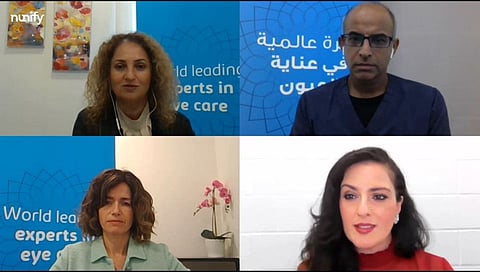Gulf News webinar spotlights the importance of regular eye examinations
Experts from Moorfields Eye Hospital Dubai share latest eye care problems and tips

Dubai: Eyesight is precious, yet we tend to neglect eye health until there are noticeable problems with it. Since eye problems develop gradually with no symptoms, chances are that by the time you realise them, the damage has already been done. So it is important to get regular eye examinations, said experts from Moorfields Eye Hospital Dubai at a webinar organised by Gulf News in partnership with the hospital.
“People below the age of 50 years who don’t wear glasses and have no symptoms should get their eyes checked once in two years, while people above 50 and also those wearing glasses should do it annually,” explained Dr Avinash Gurbaxani, Consultant Ophthalmic Surgeon in Uveitis and Medical Retinal Diseases and Cataract Surgery and Chief of Retina Service at Moorfields Eye Hospital Dubai. “People with known diseases, such as diabetes, should get their eyes checked at least once a year.”
Distant vision impairment
According to the World Health Organisation, at least 2.2 billion people globally suffer from near or distant vision impairment. In at least half of these cases — nearly one billion people — their vision impairment could have been prevented with early diagnosis.
It is common for eye conditions to develop over time without any symptoms and one of them is cataract. Cataracts are the clouding of the eye lens, with time and age. Some symptoms that should make you visit an eye doctor are changes in prescription glasses, blurry vision, glares and sensitivity to bright light. Even though cataracts are associated with ageing and most people have it by the age of 70 years, conditions such as diabetes, ocular inflammation and some medications can also cause cataract at an early age. A cataract removal surgery can treat the disease and if the other structures of the eye are healthy, it can bring the vision back to what it was before cataract, said Dr Luisa Sastre, Specialist Ophthalmologist in Medical Retina and Cataract Surgery at Moorfields Eye Hospital Dubai. “When we remove the natural lens and replace it with artificial intraocular lens, it is a life-changing experience for patients who were fully dependent on glasses. After the surgery, they don’t need glasses anymore or require them minimally.”
Cataract surgery
For those who worry about getting an eye surgery, a cataract operation is a 10-15-minute, painless procedure that is done using only numbing drops. “The patient will be lying comfortably on a bed and the surgeon will keep them updated about what ongoing procedure. The patient can then go home and get back to most of their daily chores,” Dr Sastre added.
An eye disease that not just affects a person’s vision, but also their self-esteem and confidence is squinting. A squint is a condition in which one eye is not pointing in the right direction and could be pointing inward, outward, upwards or downwards. Squints can affect both children and adults.
“A young student with a squint once came to me and he was seeing double. He said that he had being seeing double all his life and he thought that it was normal. So, it is important to educate people and if you feel something is not right, do seek medical advice,” explained Dr Suhair Twaij, Consultant Ophthalmologist at Moorfields Eye Hospital Dubai. “We see squints in children quite often. When parents bring their children for assessment, it is important that it is during the time of the day when the child is alert and relaxed as the assessment takes some time and they’re seen by many professionals to get the squint assessed.”
Fix a squint
Dr Gurbaxani added that a surgery is not always needed to fix a squint. In fact, a surgery is rarely done these days. “In children especially, a squint can be fixed with just glasses, but they need to be regularly monitored.”
One of the diseases that doesn’t easily cross our mind and needs proper investigation is Uveitis. Uveitis is a term for a group of inflammatory diseases that affect the middle part of the eye called uvea. Even though uveitis accounts for only 1 per cent of all eye conditions, it is responsible for 10-15 per cent of vision loss. It affects both children and adults. Dr Gurbaxani explained that people with autoimmune diseases — if they have one or a family history of the same — are at a higher risk. Uveitis can also be triggered by infections. Children with joint inflammation or joint disease can get uveitis and since children are mostly asymptomatic, their eyes don’t become red and they don’t complain of anything. In adults, the symptoms can be severe, including red eyes, pain, light sensitive eyes and vision loss.
The treatment of uveitis depends on the severity of the disease. “If it affects only the front part of our eye, then it is treatable by drops. In case of it affecting the back of the eye, such as the retina and optic nerve, you need a more aggressive treatment, such as injections and steroid tablets,” said Dr Gurbaxani.
“With the availability of modern medicines, the cases of permanent vision damage have reduced substantially, and it has given young people a chance to see and stay productive for the rest of their lives.” he added.
Tips to take care of eye health
• Get your eyes regularly examined • Lubricate eyes with drops to avoid dry eyes • Between screen time, follow the 20:20:20 approach: After every 20 minutes of screen time look 20 feet away from the screen for 20 seconds to help relax muscles • Avoid using screen in dim-lit rooms • Have a healthy, colourful and fresh diet and foods that are rich in omega 3 • Spend time outdoors to give relief to your eyes
The writer is a freelance journalists in Dubai



